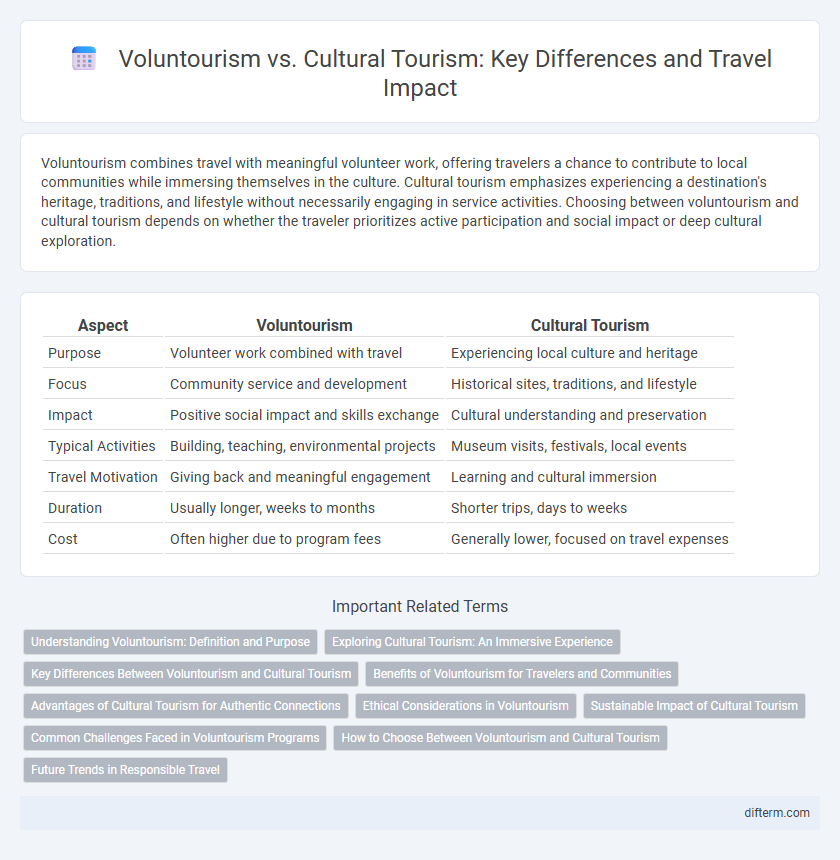Voluntourism combines travel with meaningful volunteer work, offering travelers a chance to contribute to local communities while immersing themselves in the culture. Cultural tourism emphasizes experiencing a destination's heritage, traditions, and lifestyle without necessarily engaging in service activities. Choosing between voluntourism and cultural tourism depends on whether the traveler prioritizes active participation and social impact or deep cultural exploration.
Table of Comparison
| Aspect | Voluntourism | Cultural Tourism |
|---|---|---|
| Purpose | Volunteer work combined with travel | Experiencing local culture and heritage |
| Focus | Community service and development | Historical sites, traditions, and lifestyle |
| Impact | Positive social impact and skills exchange | Cultural understanding and preservation |
| Typical Activities | Building, teaching, environmental projects | Museum visits, festivals, local events |
| Travel Motivation | Giving back and meaningful engagement | Learning and cultural immersion |
| Duration | Usually longer, weeks to months | Shorter trips, days to weeks |
| Cost | Often higher due to program fees | Generally lower, focused on travel expenses |
Understanding Voluntourism: Definition and Purpose
Voluntourism combines travel with volunteer work, aiming to contribute positively to local communities while offering immersive cultural experiences. Its purpose centers on sustainable development, fostering cross-cultural understanding, and addressing social or environmental issues through hands-on involvement. This form of tourism contrasts with cultural tourism, which primarily focuses on experiencing and learning about a destination's heritage, traditions, and arts without direct community service.
Exploring Cultural Tourism: An Immersive Experience
Cultural tourism offers an immersive experience by allowing travelers to engage deeply with local traditions, arts, and community life, fostering authentic connections and meaningful understanding. Unlike voluntourism, which centers on service and aid, cultural tourism emphasizes observation and participation in cultural practices without the responsibility of contributing labor. This approach enriches travelers' awareness of heritage and social customs while supporting local economies through responsible and respectful exploration.
Key Differences Between Voluntourism and Cultural Tourism
Voluntourism involves travelers participating in community service or conservation projects, combining travel with purposeful volunteer work. Cultural tourism centers on immersive experiences that highlight local traditions, heritage, and arts without active service components. Key differences include the intent of travel--service-oriented in voluntourism versus experience-oriented in cultural tourism--and the level of engagement in local community development.
Benefits of Voluntourism for Travelers and Communities
Voluntourism offers travelers immersive experiences that foster meaningful connections with local communities while contributing to sustainable development and social impact. Engaging in volunteer projects enhances cultural understanding, personal growth, and a sense of purpose beyond traditional tourism. Communities benefit from shared resources, improved infrastructure, and empowerment through skill-building initiatives led by volunteers.
Advantages of Cultural Tourism for Authentic Connections
Cultural tourism fosters authentic connections by immersing travelers in local traditions, customs, and daily life, promoting genuine understanding and respect for diverse cultures. Unlike voluntourism, which may prioritize short-term aid projects, cultural tourism supports sustainable economic growth by encouraging visitors to engage with and invest in local artisans, heritage sites, and communities. This immersive experience enhances cultural preservation and enriches travelers' perspectives, leading to more meaningful and long-lasting intercultural relationships.
Ethical Considerations in Voluntourism
Voluntourism raises significant ethical concerns, including the risk of perpetuating dependency and undermining local economies when volunteers lack proper skills or fail to engage with communities respectfully. In contrast, cultural tourism emphasizes authentic, immersive experiences that promote mutual understanding and respect for local traditions without imposing external agendas. Ensuring ethical practices in voluntourism requires transparent project goals, community involvement, and sustainable impact assessments to avoid exploitation and foster genuine collaboration.
Sustainable Impact of Cultural Tourism
Cultural tourism promotes sustainable impact by preserving local heritage and supporting community economies through responsible travel practices. Engaging directly with indigenous customs and traditions fosters mutual respect and helps maintain cultural identity without exploitation. Unlike voluntourism, which may sometimes cause unintended harm, cultural tourism ensures long-term benefits by emphasizing authenticity and conservation.
Common Challenges Faced in Voluntourism Programs
Voluntourism programs often encounter challenges such as lack of proper community involvement, creating dependency instead of empowerment, and misalignment between volunteer skills and local needs. Cultural tourism, by contrast, typically emphasizes authentic experiences and mutual respect, avoiding the pitfalls of unsustainable aid or cultural insensitivity. Effective voluntourism requires thorough planning, cultural competence, and genuine collaboration to ensure meaningful impact and avoid superficial or harmful outcomes.
How to Choose Between Voluntourism and Cultural Tourism
Choosing between voluntourism and cultural tourism depends on your personal goals and the impact you want to make during your trip. Voluntourism combines travel with meaningful community service, allowing you to contribute to local development projects or environmental conservation, while cultural tourism emphasizes immersive experiences in local traditions, history, and cuisine. Evaluating factors such as your desired level of engagement, ethical considerations, and the authenticity of the experiences can help determine the most fulfilling and responsible travel option.
Future Trends in Responsible Travel
Future trends in responsible travel emphasize the integration of voluntourism and cultural tourism, highlighting immersive experiences that promote local community development and environmental sustainability. Advances in technology facilitate transparent impact tracking, ensuring travelers' contributions directly support conservation and cultural preservation efforts. Growing awareness among travelers drives demand for authentic interactions that respect indigenous knowledge and foster mutual exchange rather than exploitation.
voluntourism vs cultural tourism Infographic

 difterm.com
difterm.com